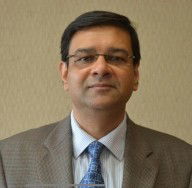Business
Patel's 'handover' at RBI is low key, unlike other governors

Mumbai, Sep 6: In keeping with the low-key style he is known for, Reserve Bank of India's new Governor Urjit Patel began his first working day on Tuesday away from media spotlights, unlike the practice followed by RBI governors in the past. There were no milling photographers at the "handover".
Patel had officially assumed charge on Sunday when the term of his predecessor Raghuram Rajan expired. Monday was a holiday here on account of the Ganesh Chaturthi, which kicked off the 10-day Ganesh festival.
An RBI spokesperson said photographs of the official ceremony of Patel assuming office would be released later on Tuesday.
Patel has taken over the bank's charge from Rajan after serving as RBI Deputy Governor since January 2013.
He has also worked at the International Monetary Fund (IMF), and was a consultant to the Union Finance Ministry from 1998 to 2001.
The RBI said Patel has a Ph.D. in Economics from Yale University, an M.Phil. from the University of Oxford and a B.Sc. from the University of London.
Following his departure from the RBI, Rajan on Monday cautioned governments and central bankers across the world against relying too much on low interest rates to propel growth or use it as a substitute for undertaking key structural reforms in the economy.
He told the New York Times in an interview that lower policy rates are often an easy solution. However, these can trap economies in a fear of psychosis that when they normalise the rates eventually could hurt growth and distort markets, thereby making a low interest rate policy difficult to abandon.
When Rajan took charge at the RBI in 2013, at a time the US Federal Reserve had declared its intent to wind down its stimulus programme, the rupee plunged in value in respect of the US dollar on fears about a spiralling current account deficit.
In a series of measures, Rajan managed to stabilise the currency that also brought back investors to the country.
"Rajan's disciplined and focussed approach in leading the Reserve Bank during his first year as governor was remarkably impressive," British magazine Central Banking said while awarding Rajan its 'Central Banker of the Year' award for 2015.
Predicting the 2008 financial meltdown that is still affecting global economy, Rajan in 2005 argued that increasingly complex markets with myriad instruments of credit and mortgage-backed securities in ever greater quantities made the global financial system a risky place.
Almost a decade down the line, Rajan is stronger in his belief that global markets now are at the risk of a crash due to the competitive loose monetary policies being adopted by developed economies.
Pointing to the very low interest rate policies of the US Federal Reserve, the Bank of Japan and the Bank of England in a bid to stimulate their economies, Rajan has been warning that emerging markets are especially vulnerable to big shifts in capital flows triggered by the unprecedented monetary accommodation in rich countries.
The elevation of Urjit Patel as Governor has naturally raised expectation among those who were critical of Rajan for not easing enough the monetary policy by cutting rates.
When talking about the challenges for Patel as the Governor, it should also be kept in mind that his moorings are as monetarist as his predecessor Rajan's were, and he is considered to attach the same importance to inflation control as did Rajan.
His views on monetary policy were expressed at the time Rajan held rates in the February 2015 review after making an unexpected rate cut a month edarlier -- the first in nearly two years.
Patel at the time elaborated on the "important backdrop" to Rajan's move to hold rates.
"We are in the midst of the age of competitive depreciation and of a beggar-my-neighbour philosophy. It brings to mind an old African saying that when elephants fight, the grass suffers," Patel said at a press conference to announce the policy review, on the trend of accommodative monetary policies being adopted by developed economies.
"While the ECB (European Central Bank) and the Bank of Japan are printing money and devaluing their currencies on one hand, the US economy is reviving on the other. Anyone in the middle is getting crushed," he pointed out.

4 hours ago
Indian diaspora leaders urge government action over passport-related delays in repatriating mortal remains

4 hours ago
srael announces 10-hour military activity pause for aid in parts of Gaza Strip

5 hours ago
Indian-origin man attacked with machete in Australia; hand reattached after near amputation

5 hours ago
Greece requests EU assistance as wildfires rage across country

5 hours ago
Two major wildfires force mass evacuations in Turkey

5 hours ago
10 killed as torrential rainfall lashes Pakistan-occupied Gilgit-Baltistan

5 hours ago
11 injured in US mass stabbing at Walmart store; suspect in custody

5 hours ago
The Third Eye: Trend setters in Trump’s America

5 hours ago
Israel to temporarily pause fighting in Gaza

5 hours ago
Hamas says Trump's remarks 'inconsistent' with Gaza talks process

5 hours ago
Every stone is witness to historical event: PM Modi on UNESCO recognition of Maratha forts

5 hours ago
PM Modi highlights India's achievements in space, science in 'Mann Ki Baat'

5 hours ago
PM Modi holds roadshow in TN's Gangaikonda Cholapuram




























